Blogs : COVID-19
IFPRI is curating a special series of blog posts analyzing the impacts of the COVID-19 pandemic on national and global food and nutrition security, poverty, and development. The series is edited by IFPRI director general Johan Swinnen and A4NH director John McDermott.
"A special series of blog posts co-edited by IFPRI director general Johan Swinnen and A4NH director John McDermott"

Read moreFears of COVID-19 transmission, along with social-distancing measures, have disrupted many important public services worldwide, both directly and indirectly. In India, Phuong Nguyen and colleagues conducted surveys to compare use of public health and nutrition services before, during and after COVID-19 lockdowns in the state of Uttar Pradesh.
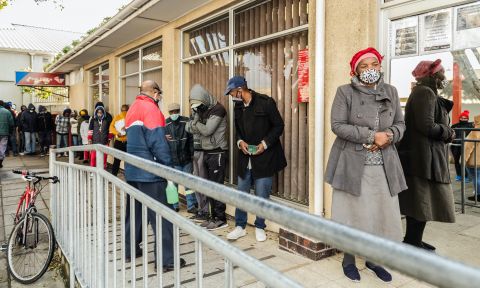
Read moreWhile we have learned a lot about the social and economic impacts of the COVID-19 pandemic and policy responses to it, many countries continue to face difficult decisions as they confront new waves of infections and medium term impacts.

Read moreCOVID-19 has disrupted programs that assist vulnerable populations worldwide. In addition to education, schools provide daily meals and other services that many families depend on; when schools closed during the pandemic, those services ceased.

Read moreThere has been much discussion on the resilience of different types of agrifood value chains during the COVID-19 pandemic. Good empirical evidence on this issue is limited because comparing value chains must account for variations in several factors (different commodities, different countries, etc.).
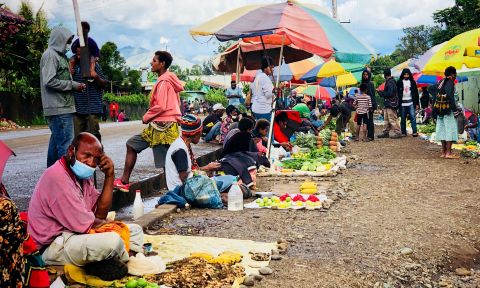
Read moreIn general, the COVID-19 pandemic has had only modest impacts on food availability but greater consequences for food affordability. During the food price crisis of 2007-8, rice prices increased dramatically in rice-importing countries such as Papua New Guinea (PNG) when rice-exporting countries imposed export bans.

Read moreWhile COVID-19 transmission dynamics and impacts have been different in rural and urban areas, big impacts on rural incomes and livelihoods have been observed. In this post, Catherine Ragasa, Isabel Lambrecht and Michael Wang assess income impacts on landed and landless rural people in Myanmar’s Central Dry Zone, comparing bi-monthly surveys during the pandemic to pre-pandemic b

Read moreGlobal patterns and local variations of COVID-19 impacts on income, food security, and dietary diversity are gradually emerging. In this post, Francisco Ceballos, Manuel Hernandez, and Cynthia Paz document these effects on the vulnerable population of the Western Highlands of Guatemala.

Read moreBangladesh’s March-May 2020 COVID-19 lockdown has had severe consequences for the incomes and food security of poor households. Public food transfer programs have traditionally been the most common social protection programs in Bangladesh.

As COVID-19 continues to affect people around the world, an understanding of the scope of impacts from the pandemic and the lockdowns, mobility restrictions, and other policies enacted in its wake is only beginning to emerge.
Read more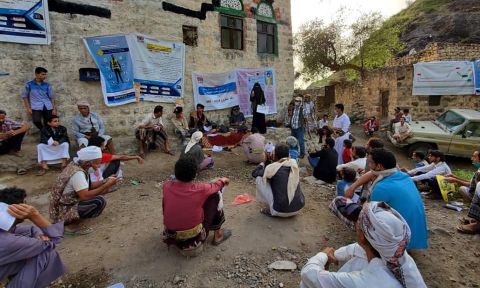
Read moreThe day-to-day hardships of the COVID-19 pandemic are often compared to life during wartime. But Yemenis have it far worse: They are experiencing a pandemic and a war simultaneously. Before 2020, Yemen’s ongoing civil war had cut GDP almost by half; since then COVID-19 has further decimated the economy.

Read moreMultiple studies have documented the negative impacts of COVID-19 on the poor and vulnerable. Over the past decade, rigorous evaluations have shown Ethiopia’s Productive Safety Net Program (PSNP) yielding positive results in addressing household poverty and food insecurity in the low-income districts it targets.

Read moreThe long-term social and economic impacts of the COVID-19 pandemic are unknown, but many worry that lockdown-related school closures lasting months will have enduring effects.

Read moreMyanmar is undergoing rapid changes. The course of the COVID-19 pandemic there reflects this dynamic context, which is influencing both coronavirus transmission and its socio-economic impacts. A severe second wave of infections has led to lockdowns since mid-September—the second set of strict controls imposed after the initial outbreak in the spring.

Read moreThe COVID-19 pandemic has led to multiple disruptions in food demand and supply, and while in general food systems have proven more resilient than many expected so far, the poor and vulnerable have been hit hardest. In this regard, food prices are a critical indicator.

Read moreIndia’s COVID-19 economic relief package includes a set of important agricultural reforms that some see as the “1991 moment” for Indian agriculture—referring to the 1991 economic liberalization that triggered decades of strong economic growth. In this post, S.

Read moreCOVID-19 has made the issue of resilience of the world’s food supply chains one of our top food security concerns. The Chinese experience provides important lessons about the dynamics of resilience.

Read moreAs COVID-19 spread to many low and lower-middle income countries in March and April and control measures were imposed, researchers began monitoring impacts on income and food security. Many relied on phone surveys to capture the initial effects. As time passes, follow-up surveys can help to refine those initial observations and account for changing circumstances.

Read moreAs the COVID-19 pandemic continues to spread and persist, disrupting economies, food, health, and social protection systems, hard-won global progress on child nutrition and health are at risk.

Read moreLockdowns imposed in response to the COVID-19 pandemic have disrupted food markets across India. Sudha Narayanan of the Indira Gandhi Institute of Development Research explains that nevertheless, parts of the food system have thus far proven “surprisingly resilient”—and that what happened can only be understood taking into account the complexity and variety of India’s food suppl

Read moreFood supply disruptions in developing countries during the COVID-19 pandemic have been varied and often severe, especially in labor-intensive segments of supply chains. Tom Reardon of Michigan State University and IFPRI’s Jo Swinnen summarize early experiences in both international and domestic supply chains across various types of firms and commodities.

Read moreThe COVID-19 pandemic has hit the global economy hard, and in many places other factors—such as the locust invasion in East Africa and falling export commodity prices—are compounding its effects. FAO Chief Economist Maximo Torero observes that no modern economy has experienced anything like the combination of the Great Lockdown and the worst recession since the Great Depression,

Read moreAs COVID-19 spreads in more low- and middle-income countries, we see a range of responses and effects. In this blog post, Xinshen Diao and Michael Wang assess the direct and indirect impacts on Myanmar’s economy after a two-week lockdown. Almost all households have reduced income from disrupted domestic economic activity or lost remittances.

Read morePolicy makers and researchers tracking the impacts of COVID-19 and control measures have thus far focused mostly on urban areas, where the disease can spread rapidly.

Read moreThe poor and other vulnerable groups are suffering the most negative consequences from the COVID-19 pandemic. In response, many governments are rapidly expanding social protection programs.

Read moreThe COVID-19 pandemic and the lockdowns that followed have disrupted private food supply chains and the public support systems the poor rely on for food and good nutrition. But these problems have also triggered many creative and entrepreneurial responses.

Read moreControl of epidemic diseases relies on public compliance with government decisions and scientific advice. What does trust have to do with it? According to Danielle Resnick, a lot: Changing the behavior of citizens depends upon it.

Read moreWater is essential for drinking, sanitation, and food production; for billions of people, however, water access and quality are limited. The COVID-19 pandemic has further amplified the impacts of these water inequalities.

Read moreCountries have taken varied actions to limit the spread of COVID-19; Ethiopia has imposed less severe controls on movement and other activities than many other countries. Nevertheless, these are having a significant economic impact, with the urban poor likely to be hit hardest.

Read moreThe COVID-19 health and economic crisis has stimulated multiple and varied policy responses in developing countries. Some of these are designed for specific national contexts and others are more generic. Some are narrowly-focused, others a complex mix of interacting measures.
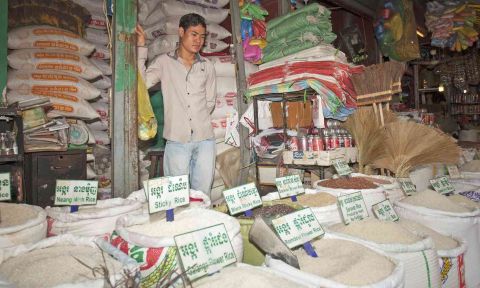
Read moreSome governments have responded to alarms about possible COVID-19-related food shortages much as consumers would: By trying to hoard food. A number of countries have limited exports of key staple food commodities to protect domestic supplies.

Read moreAcross Africa, countries have imposed emergency border restrictions to curb the spread of COVID-19. These have delayed a continental free trade agreement, are contributing to fears of a new food crisis, and disrupted cross-border trade.

Read moreLow and middle-income countries (LMICs) are suffering rapid and substantial economic costs from the spread of COVID-19 and related lockdown measures. James Thurlow describes initial assessments of economy-wide impacts in some African countries and their varied effects on different sectors and types of households.
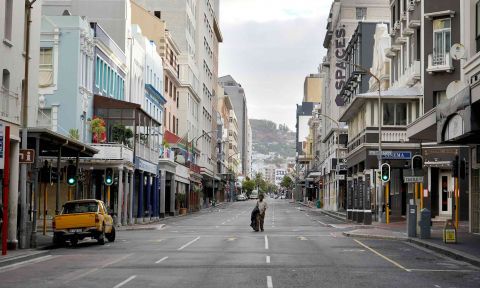
Read moreCOVID-19 is expected to have major impacts on poverty in Africa, but there is much uncertainty.

Read moreFood systems are complex and the disruptions caused by COVID-19 are varied. Global analyses of trends in food supply, trade, and prices are useful.

Read moreThe COVID-19 pandemic and restrictions on movement to control the spread of infection are having profound impacts on the income and daily lives of people in low- and middle-income countries, particularly the poor. Governments and donors are responding by expanding social protection programs.

Read moreNutrition has been a development priority for a decade. Many countries have strengthened nutrition policies and programs with some measurable success. Derek Headey and Marie Ruel look at available evidence to show that nutrition progress will be threatened by the COVID-19 crisis, particularly if it persists.

Read moreControlling the COVID-19 pandemic in low- and middle-income countries will require applying basic health, hygiene, and physical distancing measures well. Daily implementation of these will largely depend on women, but they face many obstacles men do not.

Read moreAs the COVID-19 pandemic spreads, social and economic relief measures—including fiscal stimulus and expansion of social safety nets—are crucial to prevent poverty and hunger from rising dramatically in developing countries.

Read moreVegetables are a key source of essential nutrition and play a crucial role in healthy diets.

Read moreMeasures to contain COVID-19 are expected to have significant effects on food value chains—but with important differences between commodities. Horticultural products are expected to be especially vulnerable because of their seasonal labor requirements and high perishability.

Read moreCOVID-19 is disrupting economies around the world, but will it cause a food crisis? IFPRI Director General Jo Swinnen says it depends whether you are rich or poor.

Read moreWith COVID-19 now spreading in India, massive consequences to health and livelihoods are feared, and the government has imposed a 21-day national lockdown to limit virus transmission. Given the precarious livelihoods of many Indians, agriculture, food security, and safety net policy and program responses are also urgently required. Prof.

Read moreThe outbreak of COVID-19 is a rude awakening to many who believed the era of infectious disease was over.

Read moreCOVID-19 poses an extraordinary challenge for India—both for infectious disease control and for maintaining food security and livelihoods. As part of its response, India is adapting the world’s largest portfolio of food distribution and safety net programs to provide food to its poorest citizens.

Read moreRich countries have introduced massive health and public spending programs to counter the economic effects of the COVID-19 pandemic.

Read moreThe organization of food supply chains (FSCs) is strongly affected by the level of economic development and factors such as urbanization and globalization. COVID-19 will thus have different impacts on FSCs in poor vs. in rich countries.
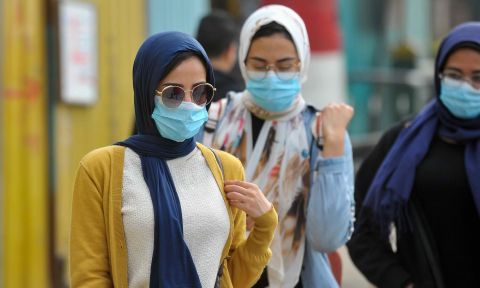
Read moreAs COVID-19 reaches everywhere, low- and middle-income countries are racing to respond to this massive and fast-moving challenge. In the first country blog post in this series, Clemens Breisinger and colleagues assess the pandemic’s economic impacts for Egypt.

Read moreInformal food markets are vital to feeding African cities, venues the poor rely on to buy and sell fresh food. Danielle Resnick argues that as governments impose COVID-19 restrictions, informal food traders should be helped rather than persecuted.

Read moreGiven the speed at which COVID-19 is spreading, we must draw on policy and practice experiences from past epidemics—each is unique, but they offer many common lessons. AIDS was another once-in-a-generation pandemic.

Read moreCOVID-19 lockdowns have major impacts on migrant workers and supply chains that depend on them.

As COVID-19 spreads around the globe, fears of a deep global recession are mounting. Some also fear that food supplies may start running short, especially if supply chains are disrupted. Others fear that agricultural production may be disrupted by containment measures that restrict workers from harvesting and handling crops.
Read more
After the COVID-19 outbreak began in December in Hubei Province, many Chinese villages were locked down to control the spread of the disease. As the epidemic has eased, China has only begun to lift some restrictions. The lockdowns have had a significant—and still not well-understood—impact on the agricultural sector.
Read more
The analysis in this piece has been updated in a new blog post to reflect the growing impacts of the spread of COVID-19 and economic shutdowns.
Read more

The analysis in this piece has been updated in a new blog post to reflect the growing impacts of the spread of COVID-19 and economic shutdowns.
Read more
The COVID-19 outbreak is showing a new trend. While the situation in China has improved dramatically, several countries, especially the Republic of Korea, Japan, Italy and Iran, have been reporting more new cases. In fact, these countries have reported more new confirmed cases than China, most of which are in Wuhan, the epicenter of the epidemic in Hubei province.
Read more
The current novel coronavirus (COVID-19) outbreak originated from a seafood and wild food wet market in Wuhan and has quickly spread across China and to at least 25 other countries, causing more than 1,000 deaths (virtually all in China).
Read more